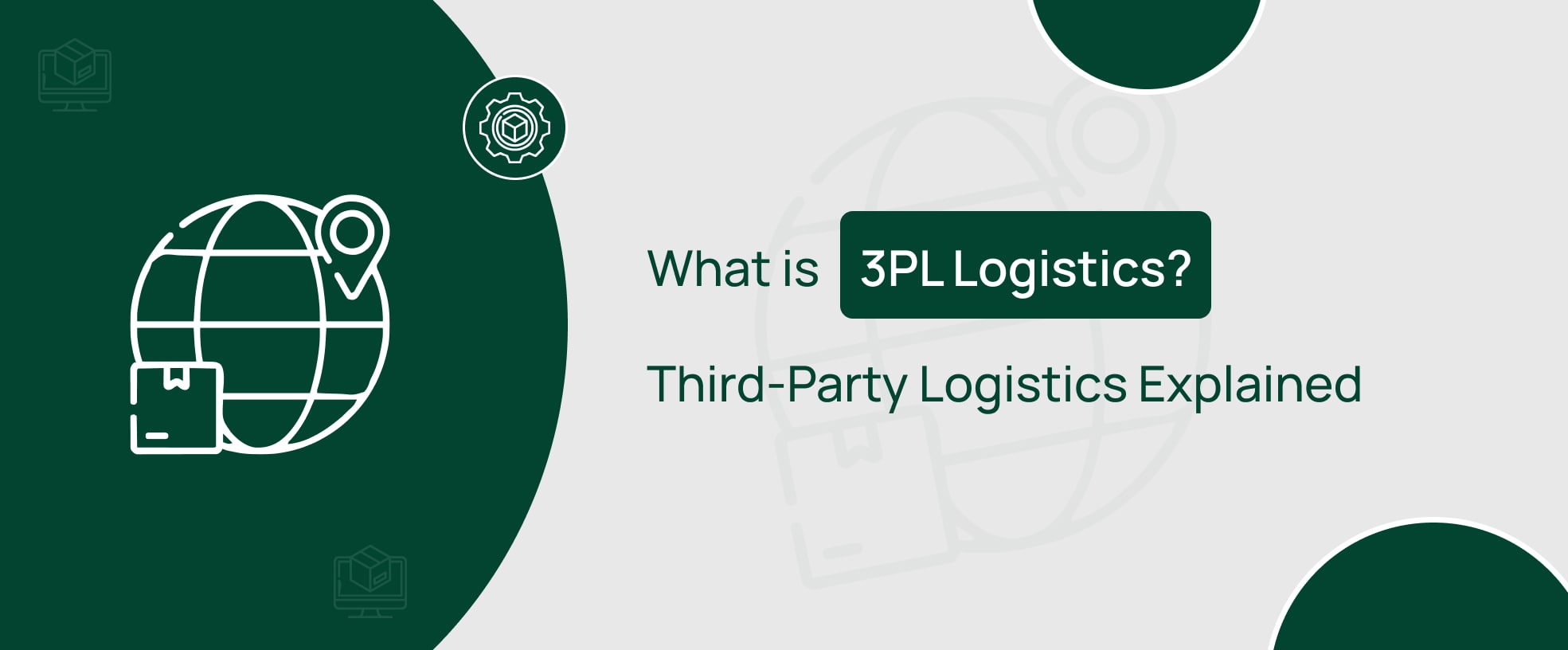What is 3PL Logistics? Third-Party Logistics Explained

Behind the success of every e-commerce giant today is a third-party (3PL) Logistics provider. It works silently and continually in the shadows to help brands win the race.
Juggling with the loopholes, inaccuracies, and inefficiencies of logistics? Let the 3PL logistics service provider handle all! What is 3PL logistics, what are the various types, and how does it work? This guide covers everything!
What is The Meaning of 3PL?
3PL is an acronym that stands for third-party logistics service provider. It arranges, monitors, and handles different types of supply chain operations. Smart Logistics companies outsource all their logistics operations to expert 3PL service providers, who manage storing, brokering, picking, packing, shipping, building growth strategies, etc.
Businesses use 3PL logistics services to streamline operations, save costs, and improve efficiency. They take the onus of managing all the logistics operations and help companies focus on essential marketing strategies.
What Does a 3PL Provider Do?
A 3PL company is a link that connects businesses with their customers. Their duty is not just confined to moving goods and managing them in the warehouse. They optimize the supply chain, consult, make strategies, and, in short, take care of the entire logistics for their clients. This ensures efficiency, cost savings, and a high customer retention rate.
Several top-rated companies, like FedEx, DHL, etc., provide much sought-after 3PL services.
Why is Third-Party Logistics Necessary?
Third-party logistics are necessary for several reasons.
Did you know? According to a report by Statista [1],66% percent of 3PL Logistics companies stated that technology investments is the #1 challenge, following which were increasing operational costs, and the third highest was maintaining qualified labors.
What Are The Types of 3PL Services Offered By Providers?
Different types of 3PL or Third-party logistics service providers offer different services tailored to the needs of the supply chain. Some, like standard 3PL services, specialize in basic warehousing transportation operations, while others provide advanced value-added or industry-specific services.
Standard 3PL Services:
Standard 3PL services entail all the basic logistics activities, such as managing the warehouse, inventory tracking, shipping, handling distribution, and order fulfillment.
Examples: FedEx and DHL are the top logistics service providers helping businesses store, manage, and handle inventory. Their centralized inventory and strategic order fulfillment model have assisted companies for a long time.
Specialized 3PL Services:
As manifested by their name, these services deal with industries having demands such as food and beverages, pharmaceuticals, electronics, and temperature-sensitive supplies. Also, specialized 3PL services take care of warehousing and transportation of hazardous supplies where strict regulatory compliance is needed.
Examples: Kuehne + Nagel (top freight forwarders) and D B Schenker (logistics division of Deutsche Bahn) are some of the prominent specialized 3PL service providers.
Value-Added Services:
Value-added third-party logistics service providers provide essential services, including packaging, assembly labeling, etc., in addition to the basic logistics services.
Examples: Ryder (supply chain solutions) and XPO (freight transportation and last-mile deliveries) lead value-added 3PL services. They handle all the minute supply chain tasks to boost efficiency and cost savings.
Benefits of Outsourcing Logistics To a 3PL Provider
Opting for 3PL logistics offers multiple benefits. These service providers help companies streamline logistics operations, save costs, and focus on their core business operations. Hiring third-party logistics service providers leads to leveraging technology and expertise for maximal benefits.
Cost Savings and Continual Growth:Hiring 3PL means reducing infrastructure, labor, and shipping costs. During seasonal fluctuations, businesses can scale up or down without spending permanent resources.
Expertise and Advanced Technologies:3PL services have industry expertise. They also use cutting-edge technologies like Logistics management software for inventory tracking, useful data insights, etc. This helps companies make better decisions, save costs, improve efficiency, and adjust to the market needs.
Better Customer Satisfaction Rate:When 3PL services handle all the logistics tasks like inventory tracking, route optimization deliveries, etc., end-customers receive supplies on time and can track goods anytime. This leads to a high customer satisfaction rate.
Now that you know why 3PL is necessary and its benefits, let’s delve into how it works.
How Does 3PL Work? Step-by-Step Process
A third-party logistics service provider manages all logistics operations on behalf of its clients, leading to faster and smarter deliveries. These service providers follow a streamlined, chronological strategy for managing supply chain operations.
Here is a breakdown of the steps that 3PL service providers follow:
Step 1: 3PL Software And Platform Integration
First, the businesses’ ERPs or E-commerce platforms are integrated with the 3PL provider’s Warehouse Management Software or Logistics. This ensures inventory tracking, automated order syncing, and streamlining of other operations.
When the various warehouse processes are automated, manual errors are reduced, processing times are reduced, and visibility across the supply chain is enhanced. Also, with predictive analytics, businesses can monitor stock levels in real-time and make informed decisions.
Automate Your Warehouse OperationsStep 2: Managing Warehouse and Inventory
Once the software is integrated, you can fully manage several warehouse operations. 3PLs make strategies to manage your inventory safely (in case of temperature-sensitive and fragile supplies) in their warehouses.
Third-party logistics services carry out all inventory and warehouse-related tasks, such as real-time stock updates, demand forecasting, route optimization, and warehouse optimization.
Step 3: Order Fulfillment (Picking, Packing, and Shipping)
Order fulfillment is a crucial phase. The service provider has to ensure that the orders are processed efficiently and accurately. This step comprises its staff picking up the right supplies from the inventory, performing quality checks, and then custom packing the items according to the brand labels.
Smart warehouse technologies used in warehouse management systems reduce errors in picking and packing, leading to efficiency and accuracy. When the items are packed and labeled, they are delivered to a trusted carrier for shipment. This streamlined process ensures timely deliveries and a high customer satisfaction rate.
Step 4: Transportation, Shipping and Freight Management
3PLs handle all the transportation expenses by collaborating with the FTL (Full Truckload) and Less-Than-Truckload (LTL) shipments. It optimizes routes with the help of cutting-edge software and negotiates freight rates with shipment carriers for cost savings.
The service providers also leverage real-time data and predictive analytics to reduce transit times, avoid delays, and increase visibility in the supply chain. By consolidating shipments, reducing the empty miles, and optimizing last-mile deliveries, they help the companies save costs and improve efficiency.
Step 5: Reverse Logistics and Returns Management
The final step involves the logistics of returning damaged goods, contributing to a high customer retention rate. Third-party logistics (3PLs) streamline all business operations, from managing the restocking process to the environmentally friendly disposal of supplies.
Moreover, automated systems are employed here again to track reverse logistics, reducing processing times and saving costs.
Comparison: 3PL Vs. Other Logistics Models
3PL providers offer all the outsourced services, like inventory, warehousing, shipping, and order fulfillment. Here’s a quick comparison between the service providers and popularly used logistics models.
3PL vs. 4PL (Fourth-Party Logistics)
3PL is focused on executing different logistics operations, whereas 4PLS monitors and manages all supply chain operations. They coordinate with different 3PLs.
Comparison:Choose 3PL for managing and streamlining various logistics operations and 4PL to consolidate the supply chain and a better strategy.
3PL vs. Freight Forwarding
As stated, 3PL provides all the warehousing and logistics operations that comprise inventory tracking, warehousing, demand forecasting, and more. On the other hand, freight forwarders deal exclusively with the shipping of goods.
Comparison:Choose third-party logistics to streamline and manage all logistics operations and freight forwarding software to manage all shipment-related processes.
3PL vs. Dropshipping
3PL gives you complete control over inventory, warehouses, etc. On the other hand, the dropshipping model means an online retailer selling goods without stocking them. When a drop shipper sells a product, it is purchased from a third party and then shipped to the customers by the 3PL.
Comparison:It depends on your business goals and needs. Selecting a 3PL can ease all your logistics operations, whereas a drop shipper will help your supplies get good exposure and increase their chances of being sold.
How To Choose The Right 3PL Provider For Your Business?
Choosing the right 3PL provider is essential to achieving maximum value for money. To make the best choice, consider the following factors.
Check Out Expertise and Experience:
A trusted 3PL provider with high ratings and reviews and a proven track record for handling all logistics operations efficiently should be chosen. Assess these carefully, including experience, ability to scale, ongoing support, etc.
Warehouse Proximity to The Customers:
Another important consideration is the warehouse’s proximity to the customers. This reduces delivery times and shipping costs. and ensures on-time delivery
Easy Integration and Usage:
Check whether the software and other technologies offered by 3PLs are easy to integrate with the eCommerce platforms, ERPs inventory systems, etc. Ensure your service provider offers WMS, real-time tracking features, analytics tools, etc.
Strong Customer Service, Ongoing Support:
Strong customer service, ongoing support, clear communication, and well-defined legal agreements are essential to protect your brand reputation. This will also ensure that you do not have downtime.
Industries Using 3PL Logistics Services
Summary
In short, outsourcing your logistics and choosing the right 3PL helps you in several ways. It streamlines your logistics and saves costs plus hours, continuously increasing your productivity and profits.
These experts are well-equipped with advanced technologies, know the right strategies, and can turn your warehouse into a powerhouse.
Key Takeaways:
Want Answers At Your Fingertips? Here You Go!
Let us know if you have doubts or queries about choosing your third-party logistics service provider!
1. What is the meaning of 3PL?
3PL is an abbreviation for third-party logistics. It offers all logistics services, such as warehousing, inventory management, order fulfillment, and shipment. Businesses outsource all their logistics needs to 3PL, which builds strategies, consults, and manages operations.
2. What is an example of a 3PL?
Some notable examples are FedEx fulfillment, DHL supply chain, Shipbob, etc.
3. What are the three types of 3PL providers?
The main types of 3PL providers are:
4. How much do 3PL services cost?
The costs of these services depend on various factors, such as the shipping volume, storage, value-added services provided, reputation, and ratings. If you prefer a flat rate, you’ll need to pay between $75 and $250/month.
5. How to integrate 3PL software?
Integration of 3PL software is typically done via plug-ins that connect your systems (ERPs, e-commerce, etc.) to the WMS platforms or through APIs. This allows for syncing orders and inventory in real-time.
Efficiency, Productivity, and Profits All At A Single Click!
At iCommuneTech, we help businesses ease, streamline, and optimize all their logistics operations at the click of a button. We are trusted and highly rated among customers worldwide.
Our easy-to-integrate software, CommuteLogix, simplifies all logistics operations.
Contact us and turn hassles into hustles today!
References
1. Statista – (Source)

